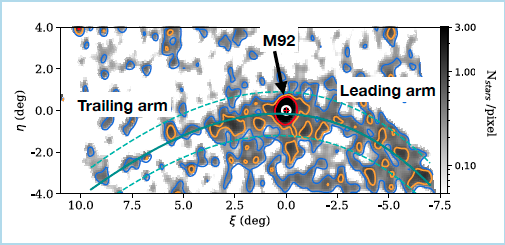The Dominion Radio Astrophysical Observatory (DRAO) is seeking a Research Associate in Radio Polarimetry Techniques to support the DRAO Radio Astronomy group within the Herzberg Astronomy and Astrophysics (HAA) Research Centre.
DRAO is Canada’s national facility for radio astronomy. Astronomers and engineers work closely together to design and build innovative radio telescopes, and use radio telescopes at DRAO and elsewhere to conduct frontline research.
The John A. Galt 26-m Telescope at DRAO conducts large surveys of radio emission from the Milky Way Galaxy. The scientists at DRAO are world experts in studying magnetic fields in interstellar space by means of inspecting the polarization of radio waves received from space. Polarization is the tendency of an electric field to have a non-random orientation when averaged over time. Magneto-optic effects such as Faraday rotation and Zeeman splitting can imprint polarized signatures on interstellar radio emission; the detection of these polarized fingerprints can allow astronomers to measure magnetic fields between the stars.
Polarized radio signals from interstellar space are very weak and the telescope itself alters the polarization state of the incoming radiation. DRAO has access to sophisticated electromagnetic simulation software (CST and GRASP 10) that will be used to produce detailed computations of the polarized antenna response.
Based on the applicant’s understanding of polarization and antennas, the Research Associate will use GRASP to compute antenna response, and will use the techniques of radiative transfer to predict the polarized response of the 26-m Galt Telescope and of the 18-m offset reflector being designed for the NRAO ngVLA project. This work will be used to simulate how the polarization states of incoming radiation leak into one another in the large-scale response of these telescopes. The Research Associate will write articles to be published in refereed scientific or engineering journals detailing the techniques used and the comparison between the predicted and measured polarization response of each telescope.
The NRC is a partner in a number of extant and future radio arrays including the DRAO Synthesis Telescope, ALMA, the SKA, and ngVLA. The results from this study will be directly applicable to the modelling of the polarized beam response of these arrays and will be an integral component of an antenna optics modelling effort that DRAO would like to develop.
The successful candidate will have:
* Significant experience in conducting original scientific or engineering research, demonstrated by published papers in the refereed scientific or engineering literature.
* Significant experience in electromagnetic simulation or modelling.
* Basic experience with radio instrumentation and/or antennas.
* Basic experience with radio interferometry/aperture synthesis and/or single-dish instrumental polarization.
* Coursework in electromagnetic wave propagation.
* Ability to write software in a scientific programming language.
It will be an asset for the candidate to have had:
* Coursework or research experience in antenna theory.
* Experience with CST, GRASP or equivalent antenna modelling software.
The initial appointment is of two years duration, which may be extended (subject to performance and availability of funds). The hiring is at the postdoctoral level and the candidate will be remunerated based on expertise, skill, outcomes, and impacts of their previous work experience.
Applicants must have received a Ph.D. in astronomy, astrophysics, physics, or electrical engineering within the last five years or expect to receive the degree within the next six months.
As an employer that values the diversity of its workforce, the NRC will give priority to applicants who have self-identified as members of the following designated groups: women, visible minorities, Indigenous peoples and persons with disabilities.
NRC employees enjoy a wide-range of benefits including comprehensive health and dental plans, pension and insurance plans, paid maternity and parental leave, relocation assistance, vacation and other leave entitlements.
Included Benefits:
NRC employees enjoy a wide-range of benefits including comprehensive health and dental plans, pension and insurance plans, paid maternity and parental leave, relocation assistance, vacation and other leave entitlements.
Related URLs:
Vous pouvez obtenir ces renseignements en français:
https://recruitment-recrutement.nrc-cnrc.gc.ca/job/Penticton-Attach%C3%A9-ou-Attach%C3%A9e-de-recherche-%28AR%29-en-radiopolarim%C3%A9trie-BC/542209717/
Information on the staff and their research interests:
https://astroherzberg.org/
Further information on the NRC’s Herzberg Astronomy and Astrophysics Research Center (NRC-HAA):
https://nrc.canada.ca/en/research-development/research-collaboration/research-centres/herzberg-astronomy-astrophysics-research-centre
Application Deadline: Monday, November 16, 2020
See full poster and apply HERE: https://career17.sapsf.com/sfcareer/jobreqcareer?jobId=10388&company=nationalreP










